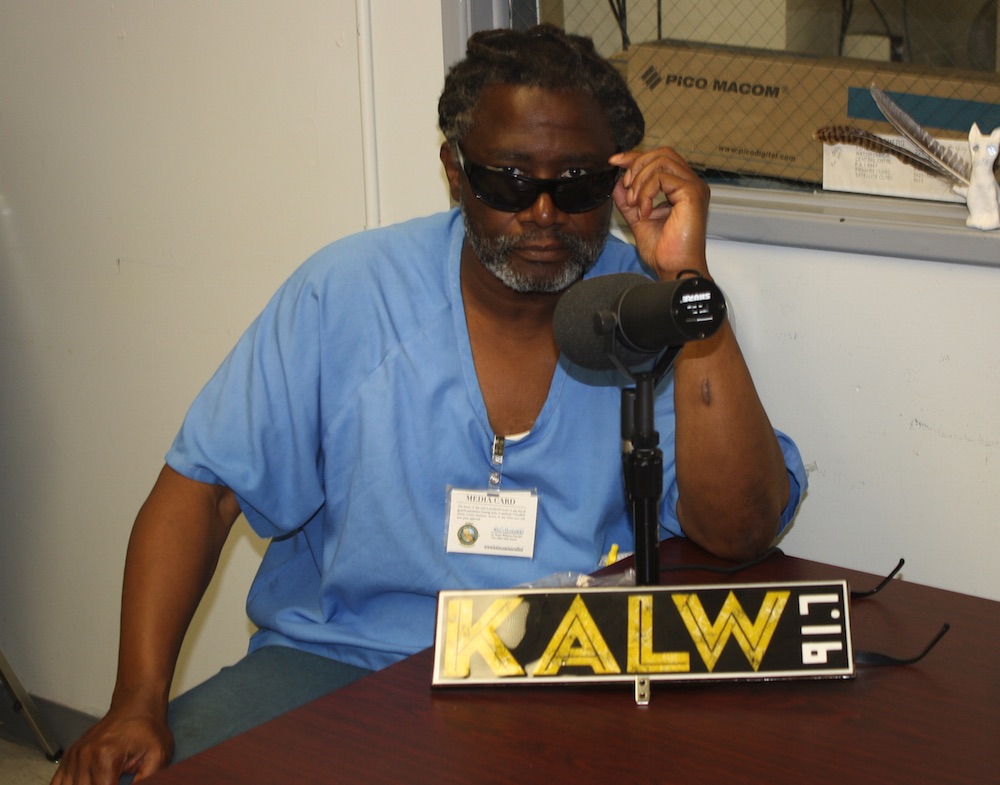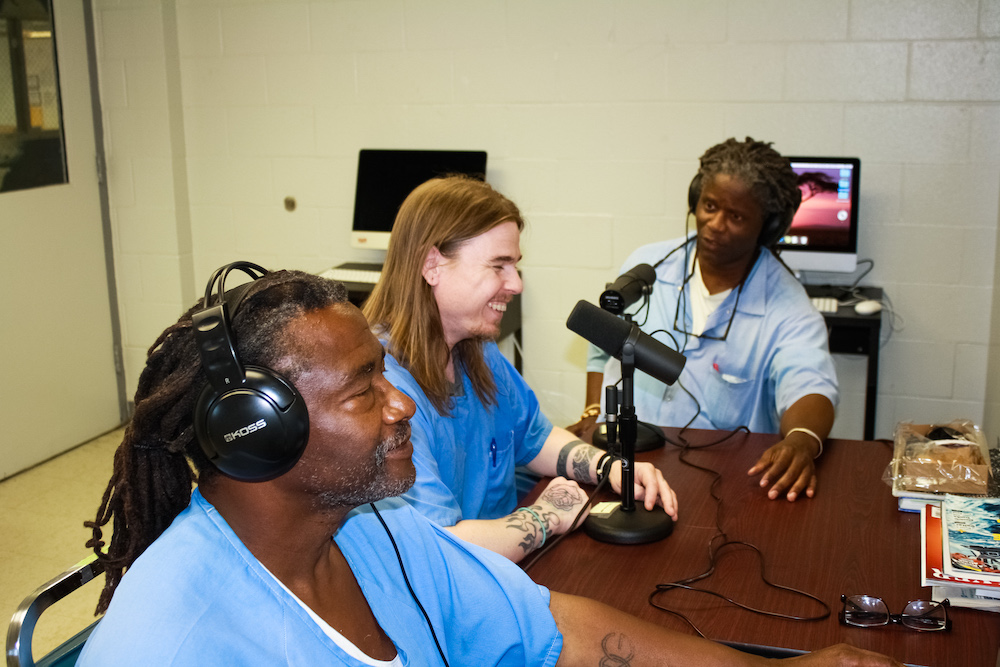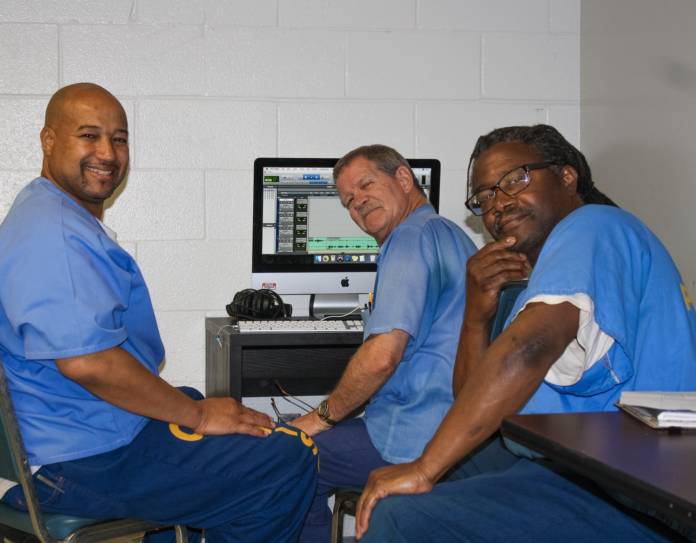As setups to Thanksgiving jokes go, a manic wild turkey that burst into a California prison compound seems almost too on-the-nose, considering how two other turkeys received presidential pardons that very day. But that was the premise for an 11-minute podcast in late November, in which inmate Bryan Mazza admits he “got his ass kicked not once, but twice” by a deranged fowl, its feathers everywhere and its wattles presumably quivering with indignation.
“I discovered something new: They can fly, they’re fast, and they’re mean as hell,” Mazza says. “It was a 12-pound bird. … It’s unbelievable how strong birds are.”
We won’t divulge any spoilers of that episode of Uncuffed. (OK, just one: The turkey “pardons itself,” getting out of the facility with the help of a guard.) Recorded and produced by a dozen men at Solano State Prison and San Quentin State Prison, in partnership with Bay Area NPR affiliate KALW, Uncuffed lets inmates tell their own stories, from making music to redress previous wrongs to opening up emotionally in the company of people who also had violent, difficult upbringings.
“I didn’t know that I could learn radio and do radio,” co-host and -producer Spoon Jackson tells 48 Hills from Solano State Prison in Vacaville, where loud announcements from a PA system periodically interrupt our first, 10-minute interview. “I had a little notoriety before I got involved in the radio: I’m a poet, been published around the world, did acting before getting involved with Uncuffed. I learned ProTools, learned to cut, paste, edit.”

“I find things that are human, like everybody has human things that make us human,” he adds. “I’m doing a piece on a guy that fell out with his kids. It doesn’t only happen in prison. It happens on the streets. There’s a microcosm of prison to the street — it’s just that everything is magnified here. I’ve got a piece I’ve done on yoga, crocheting, knitting.”
That focus on the mundane is light years away from the ultraviolent hellscapes prisons are often depicted as. Ever since Piper Kerman wrote about her 13-month sentence for drug trafficking, American media have begun paying closer attention to the day-to-day realities of incarceration. A quarter of the world’s 10 million imprisoned people are confined in America, which meant a dizzying number of untold stories. That it took a blonde woman from a privileged background to get the wider world to look beyond a “lock ’em away and throw away the key” mentality is undoubtedly a little icky. But it worked.
One of the strengths of Orange Is the New Black (the Netflix show, more than Kerman’s memoir of the same name) was how it broadened its scope to include the lived experiences of women of various races, ethnicities, socioeconomic strata, and gender formations. It wouldn’t be too much of a stretch to say that the current shift from a highly punitive, “three strikes” culture of justice to a more reparative, humane approach owes itself in part to narratives like OITNB.
But another result is that Americans who have never been incarcerated may now feel as though they know what daily life in prison is more or less like. That means it’s more important than ever to give incarcerated and formerly incarcerated people control over the discourse. We saw this in a Democratic town-hall hosted by The Marshall Project at Philadelphia’s notorious Eastern State Penitentiary in October. Attended by only a handful of candidates — one of whom, Sen. Kamala Harris, has already dropped out — it may not have been as consequential as advocates hoped. But it was still revolutionary, in that people who have “repaid their debt to society” (to use some hoary phrasing) led it.
Help us save local journalism!
Every tax-deductible donation helps us grow to cover the issues that mean the most to our community. Become a 48 Hills Hero and support the only daily progressive news source in the Bay Area.

“You are not your crime” is an important principle in the quest to end over-incarceration and recidivism, from Ban the Box to the prison-abolition movement. Uncuffed occasionally discusses its subjects’ felonies, but always in context. When discussing people who have gotten out, it’s less about the penance than the rehabilitation. When discussing people who are still incarcerated, it could be anything.
“My friend who’s Black got a piece on being friends with a skinhead,” Jackson says. “We got a piece on my poetry. Whatever story that we come up with that’s unique — that’s the one we want to do. The universal is personal, so any personal experience can be equated to anything outside. You have Democrats and Republicans, and people in here that love Trump and people in here that disagree with Trump. We did a piece on deportation. The guy who got deported was Asian but still — you got a history of discriminating against Mexicans, and Trump said he wants poels from Scandinavia, not Africa. We discuss all kinds of things.”
The first podcast debuted in October, and episodes come out every other Monday, after review by a public information officer who makes sure there’s “nothing egregious or crazy,” as Jackson put it. Musicians are prominent, as they have been on all the KALW productions from the two prisons since 2013. Episode 1 of Uncuffed deals with Sky Boii, an acoustic guitarist who sought redemption in the Pacific Islander community through song, after having taken the life of a fellow Tongan. There’s also “someone who relied on his ballet to save him from a riot,” and a story about a traveler who came to California to pick weed. If you’re unclear about the distinctions between a hobo, a tramp, and a bum, you’ll learn it from Spoon.
“We are speaking to you from a room, with windows and white, tarnished paint,” Jackson says at the top of the first episode. That bare description underlines just how little we heard from inmates during the “realignment” wave of prison reform earlier this decade, when the courts forced California to relieve extreme overcrowding in its network of 33 state prisons. Ditto when Gov. Gavin Newsom effectively ended capital punishment in California by fiat after several failed ballot propositions to repeal it. The conversation was always about them, but seldom with them. And it’s still overcrowded in there.
“This is wrong,” Jackson says. “They know it’s overcrowded, yet they can have pockets of overcrowding to reduce it to 137 percent. It’s finally started to happen — certain prisons they can keep overcrowded, but the overall prison population has to go down. … Prisoners suffer from PTSD.”
While Uncuffed refrains from prurient descriptions of life on the inside, it’s surprisingly tender about psychology and people’s mental states. Inmates who you might suppose are quintessential tough guys talk candidly about knitting and yoga. Episode 4 deals with Maserati-E, a musician who was released from prison in August at age 25, paroled while wearing a “super-super-dope” pink, Pitbull-style suit. Five inmates use his story as a springboard to discuss loss, such as the inability to attend a grandmother’s funeral while they’re locked up. It’s a remarkable, 23-minute discussion about hip-hop, desperation, death, encounters with Child Protective Services, poetry, and police brutality, shared among men who were raised to believe that boys don’t cry and who now, as imprisoned adults, want to make sure that others “don’t end up next door to me” in a cell.
As one says, “We’re conditioned to act and not to feel.” Well, now they’re doing both.
You can listen to Uncuffed, produced by inmates from San Quentin and Solano State prisons in partnership with KALW, here.








